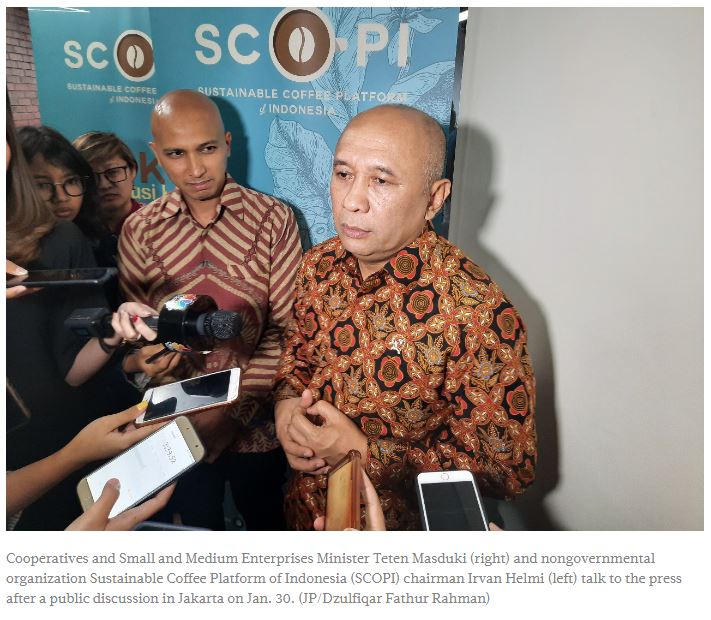Indonesia: Government mulls new social assistance for cash-strapped small businesses
The government is mulling over a plan to introduce a grant, or “productive social assistance”, to help hard-hit micro, small and medium enterprises (MSMEs) amid the pandemic slowdown, according to a minister.
“We hope it can help micro enterprises,” Cooperatives and Small and Medium Enterprises (SMEs) Minister Teten Masduki said in a virtual discussion on Wednesday. “The amount [of the assistance] is quite big.”
However, he refused to go into further details as the plan was still under discussion.
Small and medium enterprises (SMEs), which contribute to more than half of the country’s gross domestic product (GDP), have been greatly affected by the pandemic, which has forced shops, offices and factories to close to contain the coronavirus, and hit demand.
The government is seeking to speed up the disbursement of the current COVID-19 stimulus for small businesses amounting to Rp 123.46 trillion (US$8.4 billion). As of Tuesday, the government had disbursed only 9.59 percent of the budget to more than 1 million cooperatives and MSMEs.
The small business stimulus is part of the government’s Rp 695.2 trillion stimulus package to speed up Indonesia’s economic recovery.
Teten vowed that the government was “continuing to look for a solution” with regard to designing aid for SMEs, as the number of pandemic-hit small businesses increased faster than the stimulus disbursement.
The proportion of MSMEs closing their businesses due to pandemic restrictions rose by 13.1 percentage points to 49.3 percent in April from March, according to a survey of 525 respondents between April 17 and May 22 by the Asian Development Bank (ADB).
As the temporary closure stripped the small businesses of their revenue, more than half of them reduced the number of employees in April. Slashing work hours and furloughing employees were the most popular responses among the small businesses.
Around half of small businesses surveyed told ADB they were running out of cash or savings. The proportion of cash-strapped MSMEs in Indonesia was larger than in other surveyed countries, namely the Philippines, Thailand and Laos.
“MSMEs in all of the countries reported a serious lack of funds to regain their business, especially in Indonesia,” said Shigehiro Shinozaki, a senior economist at ADB.
“More concretely, in Indonesia, 88 percent of micro enterprises reported having no cash and savings, and would run out of funds in a month.”
ADB also found that most small businesses reported difficulties in getting funding amid the pandemic. As a result, around 39 percent of the small businesses borrowed money from friends and relatives, while one-fourth of them used their own remaining cash or profit.
To survive the pandemic-induced downturn, 46.9 percent of the MSMEs were considering asking financial institutions for debt restructuring.
Most Indonesian small businesses surveyed expressed hope they could get a loan without interest and collateral, as well as cash assistance or grants.
The Cooperatives and SMEs Ministry reported Tuesday that most of the small business stimulus was disbursed through state-owned banks in the form of debt restructuring funds.
The second-largest spending of the stimulus was Rp 381.4 billion for investment funds for 34 cooperatives through the Revolving Fund Management Agency (LPDB). The remainder went to the interest subsidy for MSMEs via the micro loan program (KUR).
Arief Ramayandi, the principal economist at ADB, said Wednesday small businesses relied on informal sources of funding because they faced issues in accessing funding from formal financial institutions such as banks.
Of the surveyed MSMEs, only 1 percent stated they borrowed from banks to get working capital. Other surveyed countries showed a similar picture, with mostly less than 8 percent of small businesses getting loans from banks.
“The problem of getting funding from formal financial institutions has not emerged only because of COVID-19, but it has been around all this time,” said Arief.
ADB has approved a $1.5 billion loan for Indonesia’s COVID-19 response and a $3 million grant for medical supplies.
The Manila-based development bank is currently processing a funding facility worth $500 million for Indonesia’s disaster response, according to Bambang Susantono, the vice president for knowledge management and sustainable development at ADB.
Source: https://www.thejakartapost.com/news/2020/07/23/government-mulls-new-social-assistance-for-cash-strapped-small-businesses.html


 Thailand
Thailand




